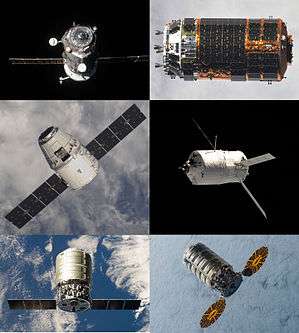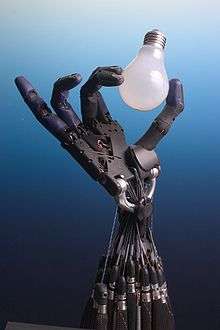Cargo spacecraft
Cargo spacecraft are robotic spacecraft that are designed to carry cargo, possibly to support space stations' operation by transporting food, propellant and other supplies. This is different from space probes, whose missions are to conduct scientific investigations.

A collage of automated cargo spacecraft used in the past or present to resupply the International Space Station
Automated cargo spacecraft have been used since 1978 and have serviced Salyut 6, Salyut 7, Mir, the International Space Station and Tiangong space laboratory.
Spacecraft
Current spacecraft
- the Russian Progress spacecraft[1]—developed by Russian Federal Space Agency
- the Japanese H-II Transfer Vehicle[2]—developed by the Japan Aerospace Exploration Agency
- the American Dragon spacecraft[3]—developed under contract from NASA by SpaceX, a private spaceflight company
- the American Cygnus spacecraft[4]—developed under contract from NASA by Northrop Grumman Innovation Systems, a private spaceflight company
- the Chinese Tianzhou spacecraft[5]—developed by the China National Space Administration
Defunct or retired projects
- the Soviet optionally-crewed TKS spacecraft
- the European Automated Transfer Vehicle[6][7]—developed by the European Space Agency. The last vehicle, Georges Lemaître ATV, completed its mission in February, 2015.
Spacecraft in development
- The SpaceX Starship is planned to be a spacecraft launched as the second stage of a reusable launch vehicle. The concept is under development by SpaceX, as a private spaceflight project.[8] It is being designed to be a long-duration cargo- and passenger-carrying spacecraft.[9] While it will be tested on its own initially, it will be used on orbital launches with an additional booster stage, the Super Heavy, where Starship would serve as the second stage on a two-stage-to-orbit launch vehicle.[10] The combination of spacecraft and booster is called Starship as well.[11]
- In January 2016, NASA announced that Sierra Nevada Corporation's Dream Chaser had been awarded one of the contracts under the second round of the agency's Commercial Resupply Services contracts. NASA committed to purchasing a minimum of six resupply missions to the ISS.[12]

Canceled projects
- The American private-sector Kistler K-1 from Rocketplane Kistler saw its contract with NASA terminated in October 2007 when the company failed to meet objectives. The contract was re-awarded to Orbital Sciences Corporation.[13][14]
gollark: ++exec```luaprint "\96\96\96 @everyone \96\96\96"```
gollark: Alternately have some way to subscribe to these gaming announcements separately.
gollark: Yes.
gollark: ++exec```luaprint "\96\96\96 @everyone"```
gollark: Since this is limited-time and osmarks.tk is kind of good please announce this to everyone.
See also
References
- Gunter's Space Page: Progress-M 1M - 10M (11F615A60, 7KTGM).
- "NASA Sets Briefing, TV Coverage of Japan's First Cargo Spacecraft". NASA. Retrieved 2009-09-03.
- "F9/Dragon Will Replace the Cargo Transport Function of the Space Shuttle after 2010". SpaceX. 2008-12-23. Archived from the original on 2009-07-21. Retrieved 2010-02-15.
- "Canadarm2 Captures Cygnus".
- "China launches its first unmanned cargo spacecraft". phys.org. 2017-04-20. Retrieved 2017-04-20.
- ESA Automatic Transfer Vehicle
- Thales Alenia Space ATV & ISS Modules, archived from the original on 2010-07-06
- Berger, Eric (29 September 2019). "Elon Musk, Man of Steel, reveals his stainless Starship". Ars Technica. Retrieved 30 September 2019.
- Lawler, Richard (20 November 2018). "SpaceX BFR has a new name: Starship". Engadget. Retrieved 21 November 2018.
- Boyle, Alan (19 November 2018). "Goodbye, BFR … hello, Starship: Elon Musk gives a classic name to his Mars spaceship". GeekWire. Retrieved 22 November 2018.
Starship is the spaceship/upper stage & Super Heavy is the rocket booster needed to escape Earth’s deep gravity well (not needed for other planets or moons)
- "Starship". SpaceX. Archived from the original on 30 September 2019. Retrieved 2 October 2019.
- "NASA Awards International Space Station Cargo Transport Contracts". January 14, 2016.
- Space.com - Rocketplane Kistler Appeals NASA Decision to Terminate COTS Agreement (22 October 2007)
- Orbital Wins $171 Million Space Station Re-Supply Demo Deal (19 February 2008)
This article is issued from Wikipedia. The text is licensed under Creative Commons - Attribution - Sharealike. Additional terms may apply for the media files.

